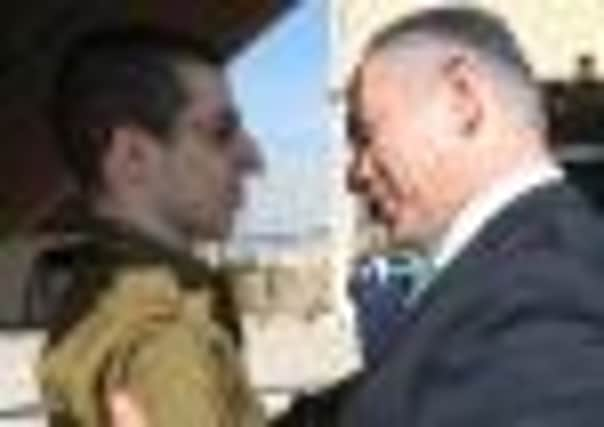Joy as one Israeli soldier and 477 Palestinians arrive home


The releases come as implementation of a landmark swap announced a week ago between Israel and the Gaza based militant Islamic group. The deal calls for the release of an additional 550 Palestinian prisoners in two months, making it the highest price Israel has ever paid for the release of one person. That is a major gain for Hamas which was the recipient of effusive thanks here from many families of those released.
In an interview with Egyptian state television after he was transferred from Gaza to Egypt en route home, Sergeant Shalit, whose fate had riveted his countrymen, said that he was “very excited” to taste freedom and had worried he would remain captive “many more years.”
Advertisement
Hide AdAdvertisement
Hide Ad“I don’t feel so good from the entire event,” said Sgt Shalit, who was captured near Gaza in a Hamas cross border raid in June 2006. “I missed my family and I missed just going out, I missed just meeting people, not just sitting all day and doing the same things”’
Later, at the Tel Nof military base in Israel, he was greeted by a buoyant Israeli prime minister Benjamin Netanyahu, who told his parents, Noam and Aviva “I have brought your son home.”
In Ramallah, thousands welcomed 117 of the released prisoners, with many people waving Palestinian and Hamas flags. Moderate Palestinian president Mahmoud Abbas greeted them as “freedom fighters and holy warriors” and called for the release of Marwan Barghouti, a leader from his Fatah faction, who is among several nationalist luminaries whose release Hamas was unable to secure. But Mr Abbas could not undo the sense that yesterday was a victory for Hamas’s path of armed struggle over his own espousal of diplomacy.
“We give thanks to the resistance,” said released prisoner Ashraf Abu Rub after hugging his relatives. “Praise to God, I feel good. May our brothers in prison hold their own and God willing may they be released soon.” Mr. Abu Rub was freed after serving ten years of a thirty five year sentence for what his relatives termed “fighting the Israelis” during the early days of the second intifada uprising in 2001.
His sister, Raja, wore the green scarf of Hamas. “I am not Hamas, but I am thankful to Hamas because it gained the release of my brother. Today is the greatest day of my life.”
Referring to the ratio of more than a thousand Palestinian prisoners for Shalit and the fact that more than 5000 prisoners remain in Israeli jails, Raja Abu Rub told The Scotsman: “We are telling a joke, that people want four more Shalits and then we will get all the prisoners out.”
In Gaza, prisoners embraced and shook hands with Hamas leaders at the Rafah border crossing. Tens of thousands celebrated at a rally that quickly turned into a Hamas show of strength.
“My happiness is indescribable,” said Azhar Abu Jawad, 30, a woman who celebrated the return of a brother who had been sentenced to life for killing an Israeli in 1992.
Advertisement
Hide AdAdvertisement
Hide Ad“We’ll get him a bride and everything. He’s so happy. This is a reminder that God doesn’t forget anyone.” Two hundred and eighty of those released were serving life sentences, some of them for attacks against civilian buses, cafes and nightclubs.
In Ramallah, Hamas leader Mohammed Ahmad, himself a former prisoner, said: “The way Hamas got out the prisoners proves to all the people of Palestine that negotiation is not the only way to free these prisoners. There are also other ways, maybe by kidnapping soldiers.”
Mr Netanyahu, in his remarks at the air base, said that he understood the pain of families at seeing those involved in killing loved ones go free. “It’s still a difficult day and the price was heavy,” he said.
Sgt Shalit’s grandfather, Tzvi, said his grandson he was tired, but lucid. “He is relieved,” he said. “He is in better condition than what we feared,” he said.
Israelis were deeply moved at Sgt Shalit’s return. “It’s a small society, we all have families and we all have soldiers in our families,” said Jerusalem resident Yaniv Levy, who works at Israel’s national library. “I feel really emotional today in a way that is hard to explain. It’s like the birth of a baby. It just moves you from inside.”